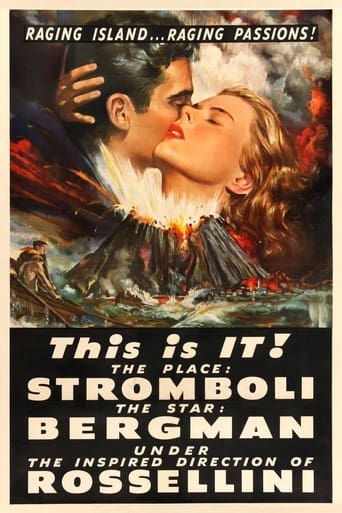Turfseer
There's quite a bit of interesting history to 'Stromboli' that goes beyond the film itself. First of course was the scandal of star Ingrid Bergman shacking up with director Roberto Rossellini and having a child out of wedlock with him. Her reputation in the U.S. suffered until she made a comeback in 'Anastasia', winning the Academy Award for Best Actress in 1956. Then there was also the controversy over the international film rights to the English language version of the film which resulted in a court fight between Rossellini and RKO Pictures.The Criterion Collection features two versions, one dubbed in Italian and the English version which also contains some Italian dialogue. Ingrid Bergman plays Karin, a Lithuanian woman, who finds herself in an Italian camp for displaced persons after World War II. She marries an Italian POW, Antonio, who she meets on the other side of the barbed wire, separating the men from the women in the camp.The couple ends back up in Antonio's fishing village on Stromboli, a volcanic island, near Sicily. Karin, a high maintenance woman used to material pleasures, resents being on the island for several reasons. First off is the threat of death or injury from the volcano itself, which periodically spews boulders and volcanic ash on the hapless village below. Then there's the hostility of the villagers (particularly the remaining female residents) who chastise Karin for her lack of "modesty." Karin also has trouble with her husband Antonio, who she regards as a simpleton and unpolished. In one telling scene, he pits a ferret against a defenseless pet rabbit, which upsets Karin greatly. Antonio, on the other hand, finds this quite amusing.Karin doesn't help things for herself when she refuses to listen to the counsel of the village priest, who urges patience, until Antonio can make enough money so they can leave the island. Even worse is when Karin attempts to seduce the priest, which alienates him greatly. Later, Karin flirts with a lighthouse keeper in front of the villagers, which damages her reputation further.Rossellini used the village locals in most of the scenes. Some of them apparently had spent some time in the U.S. and came back to Stromboli in their later years. As a result, a few are able to speak some English. The scenes where the men are helping Karin and Antonio to fix up their home, felt believable, but I wondered if the scenes of outright hostility by the local populace (particularly the women), wasn't simply an example on Rossellini's part, of forced drama (after all, if the real-life villagers were so hostile to the idea of a narrative that features an interloper that they can't stomach, would they have actually agreed to participate in the film itself?).Perhaps the best aspect of the film is the on-location cinematography, particularly the excellent scene of the fishermen hauling in the tuna. Karin is juxtaposed with the big fish catch, as she is depicted as a person alienated from nature. Only when she gets into a direct confrontation with nature (after attempting to escape the island and threatened by the volcano) does she finally have an epiphany, accepts her situation and realizes that her arrogant stance, is untenable.The role of Karin is an unusual one for Ingrid Bergman, as the protagonist here is not exactly very likable. In one respect, the part reflects Bergman's situation in her own life during that time. In marrying Rossellini and now living in his world, she had to fit into a completely different culture then where she came from.I'm on the fence as to whether there's enough there in Bergman's role of the dissatisfied and stuck-up interloper who eventually finds redemption, to keep one's interest. Yes we 'get' the idea that she's alienated but her complaints go on for a little too long. Nonetheless, 'Stromboli' has all that local 'color' featuring the real-life inhabitants of the island as well a few dramatic scenes which will definitely keep your attention (the volcano eruption, the big tuna catch, etc.). The Criterion Collection also has a number of extras worth watching, including an interview with a prominent Italian film critic.
JohnHowardReid
I gave this one a hats-off review on its first release, but I am not so fond of it now that I have Connoisseur's DVD. A slow-moving and obvious plot unwinds to an abrupt conclusion. Little attempt is made to interest us in any of the characters except our heroine. The men are boring boors who go through their motions like trained fleas and speak in platitudes. We certainly don't blame our heroine for wanting to escape from Stromboli. We're with her all the way! The men are a cruel, ignorant, self-indulgent lot who seem to relish the hardships they impose on both their fellow-islanders and themselves. The women simply put up and shut up. No doubt people did live this way on Stromboli in 1949. Maybe they still do. But 107 minutes is far too long to spend in their company.
bluerider521
When this first came to the USA, it had already garnered quite a bit of publicity because of Bergman's liaison with Rosellini. But the initial reviews were very bad. Those reviews were correct.Seen today, the movie is a mush-mash. The voice of performers change in mid sentence. Continuity is amateurish. Bergman, the lead character seems to change her personality from scene to scene. Using real people as secondary characters may have seemed like a good gimmick when they were speaking a language not understandable to the audience, but when you hear them fumble with English and hear the risible dubbing, it is a major distraction,.
tedg
I have a special interest in films where the filmmaker is directing a woman he is in love with, often freshly in love. This is a rather iconic example because of the publicity surrounding its release, together withe critical rejection. Usually you can see the way the film is bent because of the love. This case is different. Its the actress that bends to the filmmaker, who has some very bad artistic intuitions. Oh, the philosophy of real narrative in a close-to-real container is well enough. Its a clean ideal, simple to describe. When it works you get the effect and you understand its effectiveness at the same time. Unfortunately, that effectiveness is rather blunt, of the kind a fishmonger would form. Since the method and the conveyed effect are linked you get films that when they work, are effective and comprehendable, but don't matter.This one doesn't even work. Sure it has a real village and villagers, real volcano and real fishing activity. I suppose it also is genuine in its depiction of lives and the church. But it seems random. Like a dogma picture a similar manifesto the real to purity compromises what matters. There's only one false episode in this, meaning one episode where it deviates from the realist ideal. It happens to be for me the only part that touched me.Its when the wife has decided to leave at any cost, that moment when she sits down in front of what would have been a dressing table in a better world. She is flustered and unsure, but determined. She Ingrid demonstrates this. Its acting of the highest order. It fits nothing before or after in tone because for that brief moment she escapes reality to show us what is going on inside her. This would not be how it would appear in reality, but in that case we wouldn't see or know anything. Here she acts and we see truth. Its the only place where we do.There are two other noteworthy things here that I caught.The first is that the story has some tentative shape that wants to emerge. Something not followed but indicated: a lover who isn't there for anything but escape. We learn at the end, after we know that she is seriously beset, that she is pregnant. The revelation may have been simply that the actress really did become pregnant and in the service of realism it was inserted. But there's a tantalizing reverse invented narrative that we can glimpse about the handsome fisherman who she secretly meets. Is he the father? Its counter to the world of the story, which simply grinds along. But its an attractive feature. The other interesting thing is how Rossellini has decided the world works. Its against us. Society is, the church is, nature is, individuals all are. We are trapped in a pinball machine of forces that simply don't care and its random what punishment you get for being alive. Its hard to see how Ingrid could have been attracted to such a man, and enlist to help him draw this for others. She does so not just in this film, but in a personal life she built with this man, stirring up unnecessarily hostile reporting on what otherwise would have been a simple romance. She becomes pregnant in two worlds.Ted's Evaluation -- 2 of 3: Has some interesting elements.


 AD
AD


